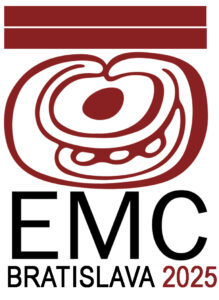EMC 30: Bratislava, Slovakia

The 30th Annual European Maya Conference is organized by Wayeb – the European Association of Mayanists – in cooperation with the Center for Mesoamerican Studies, Faculty of Arts, Comenius University in Bratislava. The conference will begin with an introductory lecture on the evening of Monday 24th November, followed by three days of workshops (25th-27th November), and concluding with a two-day symposium held from Friday 28th November to Saturday 29th November 2025.
The theme for the 30th European Maya Conference is TIME IN MESOAMERICA. The topic will be explored from a variety of perspectives.
During this conference, we will explore questions concerning timekeeping, and the significance of time, in Mesoamerica, including:
- Mesoamerican Calendars
- Origins and development of calendars
- Perception of time
- Chronology in Mesoamerican archaeology
- Temporal rituals and ceremonies
- Ethnohistorical perspectives on time
- Archaeoastronomy and time
- Alignment of structures and celestial events
- Archaeological approaches to the study of time
The theme of the conference will be approached from various disciplinary points of view – including (but not restricted to) anthropology, archaeology, archaeoastronomy, biology, epigraphy, history, iconography, linguistics, and psychology – as well as interdisciplinary approaches exploring the intersection of these disciplinary perspectives.
Bratislava EMC 2025: Preliminary Program
Monday, November 24th:
Location: Moyzes Hall, Faculty of Arts main building, Comenius University: Gondova 2, 81102 Bratislava
17:30 – 18:30 – Registration
18:30 – 21:00 – Welcome address, opening talk, and reception:
Welcome address: Milan Kováč (Head of the Center for Mesoamerican Studies, Comenius University), Jakub Špoták (Main Organizer, Bratislava EMC2025), Dora Maritza García Patzán (Comenius University & pueblo maya), Harri Kettunen (Wayeb President); Opening talk: Harri Kettunen, Felix Kupprat, Jakub Špoták, and Marc Zender: Time in the Maya World
Tuesday, November 25th to Thursday, November 27th: Workshops
Advanced Workshop & Special Workshop (ceramics): Main building, Faculty of Arts, Comenius University
Beginners' & Intermediate Workshops: Štúrova 9, Comenius University
Wednesday, November 26th at 17:30 – 18:30: Wayeb General Assembly
Thursday, November 27th at 17:30 – 18:30: Exhibition, Faust Hall & Symposium opening reception (Opening of Ferdinand Anders Library)
Friday, November 28th: Symposium, Day 1:
08:00 – 09:00 – Registration
09:00 – 18:50 – Symposium
Welcome address: Milan Kováč (Head of the Center for Mesoamerican Studies, Comenius University), Jakub Špoták (Main Organizer, Bratislava EMC2025), Dora Maritza García Patzán (Comenius University & pueblo maya), Harri Kettunen (Wayeb President)
Harri Kettunen, Jakub Špoták & Marc Zender: Time in Mesoamerica (introduction to the theme of the conference)
Marc Zender: Some Epigraphic Thoughts About Ancient Maya Astronomy (Keynote talk)
SESSION 1:
Milan Kováč – Primeras manifestaciones del arte monumental en Petén: el inicio de la tradición de estelas (Early Manifestations of Monumental Art in Petén: The Beginning of the Stela Tradition)
Jan Szymański & Julia Przedwojewska-Szymańska: The White Line that Divides Time: Archaeology of the “Before” and “After” of the Ilopango Eruption in El Salvador
Cristina Gonzalez-Esteban & James Bacon: Time to Consider Time: How Settlement Studies Can Effectively Integrate Chronological Data Through Digital Technologies
Mirko De Tomassi: Reconstructing the Timeline of Deposition Sequences in Reopened Collective Burials at Palenque, Chiapas
SESSION 2:
Francesca Glanville-Wallis: The Soils of Time: A Geoarchaeological Approach to Urban Settlement at Lamanai, Belize
Dora Maritza García Patzán: Depósitos cerámicos a través del tiempo en Uaxactun y su región noreste: Un análisis del ritualismo del Preclásico al Clásico
Socorro del Pilar Jiménez Álvarez: Entre ríos, costa y el interior: Estilos cerámicos de la pasta fina en el Área Maya
Armando Anaya Hernández: Temporal Dimensions of Settlement Patterns in Calakmul: Toward a Chronology of Urban and Agrarian Landscapes
SESSION 3:
Nikol Quardová & Jakub Špoták: Binding the Time: Power and Symbolism in the Initial Series Introductory Glyph
Nancy Martínez: Feeling Time: Ephemerality as Meaning-Bearing Quality of Writing
Presentations of the host research team
Saturday, November 29th: Symposium, Day 2:
09:30 – 17:20 – Symposium
17:30 – 18:30 – Closing address & Flag ceremony
18:30 – 21:00 – Closing reception
SESSION 4:
William Humberto Mex-Albornoz: An Approach to the Use and Symbolism of the 260-Day Count Among the Classic Maya
Catherine Nuckols: The “Burden of Time:” A Reconsideration of Full-Figure Glyphs as Carriers of Time
Christophe Helmke: Reckoning Deep Time: A Mythological Baktun 12 Text from Tulix Mul, Belize
SESSION 5:
Albert Davletshin & Sergei Vepretskii: Non-numerical Glyphs D of the Lunar Series in Classic Maya Inscriptions
Andreas Fuls: Dating of Astronomical Phenomena in the Dresden Codex and Beyond
Jakub Špoták: Tracing the Movement of Constellations: Evidence for a Possible Second 364-day Calendar Table in the Paris Codex
SESSION 6:
Natalie Korobzow: A Database for the Study of the Co-Evolution of Vigesimal Numeral Systems and the Calendar in Mesoamerica
Jan Naumenko & Sergei Vepretskii: Breaking the Lunar Code: Astronomy and Mathematics of Classic Maya Supplementary Series
SESSION 7:
Bruce Love: To Honor the Ancestors: How a Review of the Daykeepers’ Craft Over Two Thousand Years Might Resolve the Correlation Question
Victor Castillo: Layers of Conquest and Revival: The Chronologies of the Postclassic Maya Highlands
John Chuchiak: Apocalyptic Visions of Freedom: The Prophetic Roots of Colonial Maya Rebellions, 1546–1790
Closing address & Flag ceremony
Closing reception
